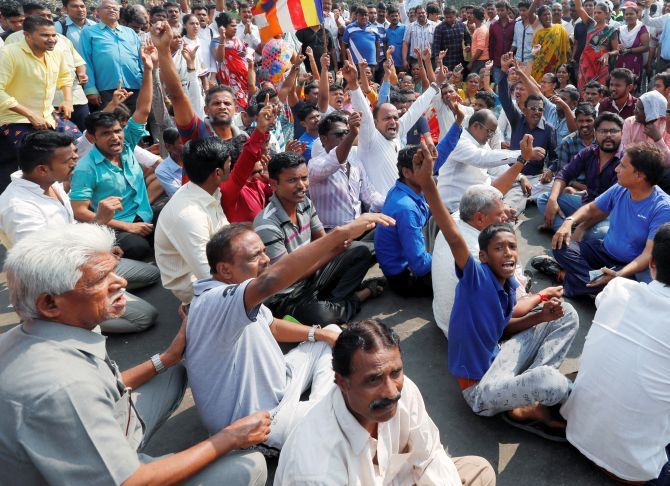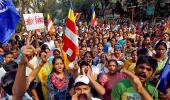Despite being hailed as one of India’s most progressive and most developed states, Maharashtra is witnessing the fallout of lopsided progress, observes Sunil Gatade

There are no straight answers to exactly what happened at Koregaon Bhima on New Year’s day, hailed as ‘shaurya divas’ by Dalits for the valour of their ancestors in the Anglo-Maratha war 200 years ago that put an end to Peshwa rule.
An incident took place, detail unclear, at nearby Vadu Budruk where the samadhi of Sambhaji is located. It led to stone throwing, near-rioting and sit-ins that engulfed large parts of Maharashtra, including the state capital, in the first week of the new year.
Now, it’s become a cocktail -- Dalits vs Marathas, Dalits vs Brahmins, Dalits vs ruling Bharatiya Janata Party and within the BJP, the chief minister, Devendra Fadnavis, vs others. It is also clear that with the impending Lok Sabha and assembly elections, everyone is trying to extract the maximum out of this muddle.
Opposition parties are blaming ‘Hindutva’ fringe elements for the incidents that brought Ambedkarite youth on the warpath; the BJP is targeting ‘outside forces’, an apparent reference to Jignesh Mewani, a Dalit leader from Gujarat, who addressed the massive rally there.
While the police, initially caught unawares, brought the situation quickly under control there, the fallout started elsewhere -- in parts of Mumbai, Pune, and Aurangabad. It was followed by a call for a ‘Maharashtra bandh’ by Prakash Ambedkar, one of the original rally organisers and grandson of the late B R Ambedkar, which was a success.
Fadnavis happens to be a Brahmin. It was said at the rally that the fight now is against the neo-Peshwas, a reference to both him and the prime minister. Peshwa Bajirao II, also a Brahmin, defeated at the battle of Koregaon Bhima which helped bring the British East India Company to full power in India, was the PM of the then tottering Maratha empire.
The protests have led to Prakash Ambedkar being treated as the Dalit voice in the state. A development the BJP can ill-afford, as it dents its social engineering platform under which it made another Dalit voice, Ramdas Athawale, not only an MP but a Union minister.
Maharashtra is changing fast. Despite being hailed as one of India’s most progressive and most developed states, it is witnessing the fallout of lopsided progress. It also has the dubious distinction of being a state reporting a large number of suicides by farmers.
The demand for reservation by the dominant Marathas is indicative of the plight of sections of various communities that have failed to become part of the ‘technological society’. The fault lines are at a time when Dalits are not happy over Marathas’ demands for reservation, fearing it might lead to encroachment on their rights.
The Marathas are also for scrapping the SC/ST (Prevention of Atrocities) Act, saying it’s been misused in the state. Silent marches taken out by Marathas over the state, with big participation and from leaders of various hues, has also alarmed ‘others’, including Dalits and Other Backward Classes about the intentions of this community.
With 48 Lok Sabha seats, Maharashtra is politically an important state in the country. The emergence of Narendra Modi has propelled the BJP, for long a laggard in state politics, to centre-stage. And, pushing to secondary status the Shiv Sena, so far treated as its ‘elder brother’ in Maharashtra. It is no secret that the sulking Sena is playing the role of the opposition while sharing power.
Bhima Koregaon is near Pune and part of prosperous western Maharashtra, where the BJP has made deep inroads in what was once the bastion of Sharad Pawar’s Nationalist Congress Party and the Congress.
With the Congress giving the BJP a run for its money on Modi’s home turf of Gujarat, if Muslims, Dalits and some others join hands, it could be a formidable combination all over. In the 1998 Lok Sabha polls, Maharashtra had seen a Dalit-Muslim-Maratha combine, leading to the Congress and its allies bagging 42 out of 48 seats.
Police firing at Ramabai Ambedkar Nagar in Mumbai in 1997 in which 10 Dalits were killed had seen the community up in arms against the then Sena-BJP government. The caste pot has again been stirred in Maharashtra. How the government stems the effects needs to be watched.












 © 2025
© 2025